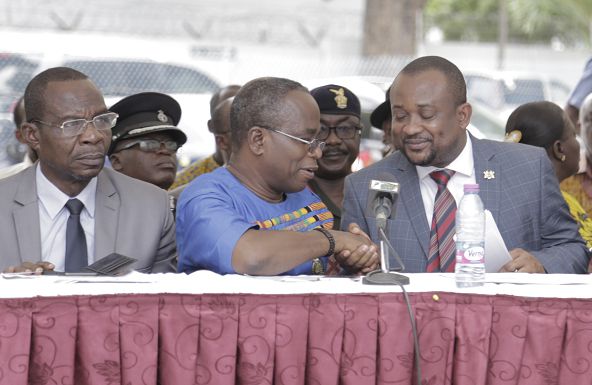
Government to ensure journalists' safety
Ghana joined the rest of the world to mark this year’s World Press Freedom Day with a commitment from the government to establish a national coordinating mechanism on the safety of journalists as part of efforts to protect them in the line of duty.
The mechanism, which is expected to be established before July, 2019, will provide a decent framework to protect journalists.
At a durbar and flag-raising ceremony to mark the day in Accra yesterday, a Deputy Minister of Information, Mr Pius Enam-Hadzide, said in addition to the safety mechanism, the government was in the process of implementing a media capacity enhancement programme to boost the capacity of media practitioners in the delivery of their mandate.
The World Press Freedom Day is marked every year to celebrate the fundamental principles of press freedom, assess the state of press freedom, defend the media from attacks on their independence and pay tribute to journalists who have lost their lives in the line of their duty.
This year’s celebration is on the theme: “Media for democracy, journalism and elections in times of disinformation”. The occasion was graced by members of the diplomatic corps, government officials, security agencies, seniors and veterans in the inky fraternity.
Advertisement
Attacks on journalists
The commitment of the government to establish a safety mechanism comes on the back of reports of violations against journalists and media workers in the country in recent times.
For instance, a communiqué issued by the Media Foundation for West Africa (MFWA) on Thursday, May 2, said from February 2018 to March 2019, a total of 22 violations against media workers in Ghana were recorded.
The communiqué said 11 of the violations were direct attacks on journalists, a situation which had led to the country dropping four places from 23 to 27 in the 2019 edition of the World Press Freedom Index by Reporters Without Borders.
Six of the violations were perpetrated by security agents, seven were carried out by political party affiliates, eight were by individuals and one by an organised group.
Instances of such violations include the killing of Ahmed Hussein Suale of Tiger Eye PI by unknown assailants on January 16, 2019, a recent attack on Malik Sulemana, Raissa Sambou and Salifu Abdul Rahman, all of the Ghanaians Times newspaper, by security agents.
Other instances were a physical attack on Jerry Azanduna of the Ghana News Agency in Bawku by political party activists, a physical attack on Karen Dodoo of Joy News and a threat against the Editor-in-Chief of the New Crusading Guide newspaper, Abdul Malik Kwaku Baako.
Govt efforts
As a country, Mr Enam-Hadzide said steady progress had been made towards a conducive environment for the practice of journalism, mentioning liberation of the media space and the passage of the Right to Information (RTI) Act as some of the strides made.
To implement the recently passed RTI Act, he said that consultation had begun towards the development of an implementation road map.
Mr Hadzide expressed concern about the growing incidence of fake news, saying “the growing incidence of citizen journalism as witnessed particularly on social media to publish falsehood and peddle fake news is a breach and an affront on citizenship.”
He, therefore, urged professional journalists to differentiate themselves from citizen journalism by relying on factual and accurate reportage.
“I want to assure the media of this government’s commitment to supporting measures that deepen the frontiers of free expression in the advancement of our democracy,” he said.
“Over-concentration on political activists”
The Chairman of the National Media Commission (NMC), Mr Yaw Boadu-Ayeboafoh, expressed concern about the over- concentration by television and radio on political activists debate and urged them to discuss national issues on their shows.
He said the media houses invited political activists without taking into consideration their competence and capacity on the issues at stake.
Issues of national interest, he said, should be discussed with individuals who were knowledgeable in the subject matter to ensure objectivity in their submissions.
Mr Boadu-Ayeboafoh said most of the political activists went on radio and television shows to show their loyalty to their party and not contribute anything meaningful to the subject at stake.
Fulfilling the mandate
Mr Boadu-Ayeboafoh underscored the need for journalists to be guided by the principle of promoting public interest rather than the interest of political parties and others, since their mandate was to serve the public interest.
“One of the mandates given to us in the 1992 Constitution is that we have to hold the government accountable to the people of this country, but when we take sides on partisan basis, we do not only lose our professional credibility but we become stooges,” he said.
Journalists, he said, needed to exercise their freedom bearing in mind that “freedom without responsibility is futile and in the same way as you cannot exert responsibility where there is no freedom. Responsibility and freedom must go hand in hand.”
He said it was only when journalists became part of history making that they would be worth celebrating and thus urged media practitioners to exercise circumspection in their reportage as the nation approached an election.
“If we think we have freedom and exercise that freedom without regard for the interest of the people we are living with, then we are destroying the foundations of that freedom”.
